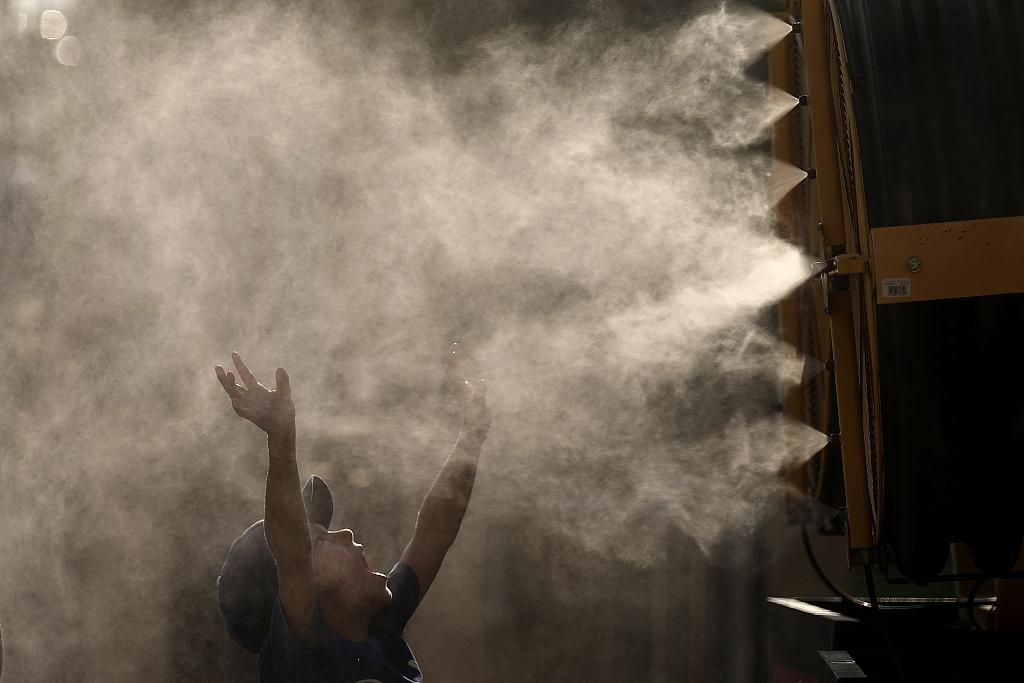Climate change makes US heat wave worse
- By Mitchell Blatt
 0 Comment(s)
0 Comment(s) Print
Print E-mail China.org.cn, July 7, 2023
E-mail China.org.cn, July 7, 2023

A boy cools off in a mister at a stadium as temperatures approach 100 degrees Fahrenheit in Kansas City, Missouri, on June 28, 2023. [Photo/VCG]
When I moved to Thailand last year, I thought Thailand was hot. In fact, it is sweltering. The temperature most days is in the high 30 degrees Celsius. I sweat everywhere I go. My air conditioning bill has risen.
But at least I have air conditioning. Construction workers in the U.S. State of Texas who are working in even hotter conditions don't have AC, fans, or even water breaks. Earlier in June, the right-wing Texas legislature passed a bill banning cities and states from mandating breaks for construction workers. And, because of a heat wave, Texas is actually currently hotter than Thailand and the rest of Southeast Asia.
Austin, Texas, is 39 degrees Celsius. New Orleans, Louisiana, is 37 degrees Celsius. Phoenix, Arizona, is 42 degrees Celsius. Temperatures this high would have been considered extreme just five years ago. Unfortunately, due to climate change, extreme weather is becoming common in the U.S. and much of the world.
Thirty-seven degrees Celsius is a benchmark in the U.S. because it is 100 degrees Fahrenheit. Texas is seeing many 37 degrees Celsius days, and they are coming earlier and earlier. In Houston, Texas, there was only one 100 day in 2001 and 2002. But last year, there were 22 days with triple-digit temperature readings on the thermometer, and this year, there have already been three.
Heat waves have always happened. The current high temperatures in multiple U.S. states and much of Mexico are being caused by a heat dome, conditions created by pressure systems that put a roof of hot air over a large area.
Michael Wehner, a researcher at the Laurence Berkeley National Laboratory, said that the temperature during this heat wave is about 3 degrees Celsius higher because of climate change. Three degrees can cause serious effects on people's health and well-being.
About 7,000 people die in the world every year because of heat waves, according to the United Nations. In the U.S., heat either causes or contributes to about 2,000 deaths per year. The elderly and poor people without access to air conditioning are most at risk. But workers who spend hours in the hot sun doing demanding physical labor are also at risk.
Among all occupations, construction is one of the most dangerous jobs for heat stroke, according to OSHA, the agency in charge of protecting worker safety in the United States. There are no national rules or standards mandating construction workers to have access to water breaks. There are no statewide rules in Texas, either. That's why some cities have made local rules. Usually, those cities are governed by Democratic mayors and Democratic city councils, as the Democratic Party is more concerned with protecting workers' rights.
Austin, one of Texas' most liberal cities, passed a law in 2010 requiring that construction companies operating in their city limits give workers 10 minutes of break time for every four hours they work. It's not a burdensome demand, and it has been in place for over a decade long and has not caused any problems.
But the Republican-controlled state legislature passed a law effectively repealing Austin's law and similar laws in other cities. Increasingly, Republican legislatures have turned to trying to govern liberal cities in their states where they were not elected and do not have jurisdiction.
Such power grabs are attempts by power-hungry Republicans to make political points and exercise power over everyone. But they have real-world consequences. In 2022, 279 Texans died of extreme heat. Over 100 construction workers die in Texas most years. And without laws requiring workers are allowed to take breaks, 4-in-10 workers won't be allowed to have breaks, according to a survey conducted by the IBEW union.
June is the coolest month of the summer. Temperatures are only going to get hotter in July and August. Without policies to protect vulnerable Americans, including providing cooling shelters, making sure people have access to electricity to run their air conditioners, and workers' rights protections, more will die. In the long term, however, the world needs to work together to slow the rising rate of global temperatures.
Mitchell Blatt is a columnist with China.org.cn. For more information please visit:
http://m.keyanhelp.cn/opinion/MitchellBlatt.htm
Opinion articles reflect the views of their authors, not necessarily those of China.org.cn.





